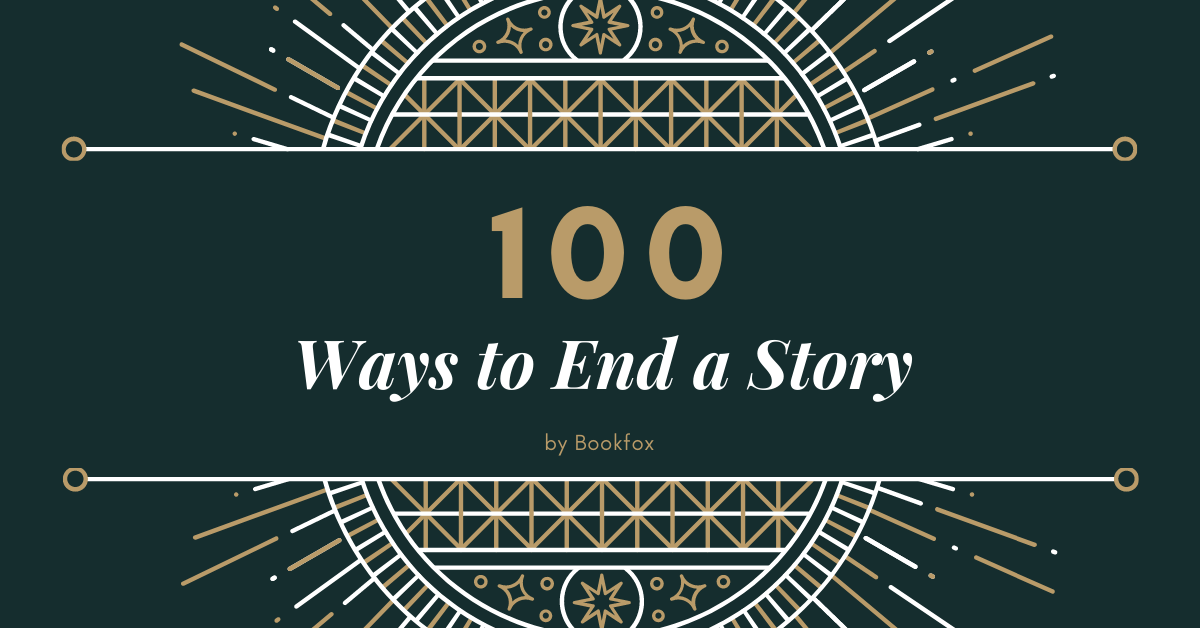 There is a certain magic in a well written ending. It must be both satisfying and surprising, unexpected and also perfectly fitting.
There is a certain magic in a well written ending. It must be both satisfying and surprising, unexpected and also perfectly fitting.
But where do you stop? Which sentences are the last sentences?
In this post, we’ll look at 100 ending lines from a diverse group of authors, both novelists and short story writers. We’ll identify how different types of endings contribute to a story. And, ultimately, we’ll determine how the author crafts a sense of satisfaction in their closing phrases.
After collecting many, many endings, the following categories emerged:
Cliffhanger

Normally, writers think of using a cliffhanger at the end of a chapter. But they absolutely can be used at the end of a story or book, for a few reasons:
- Pique the reader’s interest for the next book in the series
- Uses the “in media res” technique to go out on a high point, rather than dribble to a conclusion
- Extend the reader’s imagination beyond the story, so they finish hungry for more, and curious about the future of the storyline. It keeps the story alive, rather than closing it off.
Examples:
“Lie back, Michael, my sweet.” She nodded briskly at Pauline. “If you’ll secure the strap, Nurse Shepherd, then I think we can begin.”
— Ian McEwan, “Pornography”
“I turned and looked past the neighborhood kids — my playmates — at the two men, the strangers. They were lean and seedy, unshaven, slouching behind the brims of their hats. One of them was chewing a toothpick. I caught their eyes: they’d seen it too.
I threw the first stone.”
— T. C. Boyle, “Rara Avis”
“Then his father walks toward the door stooping slightly and B stands aside to give him room to move. Tomorrow we’ll leave, tomorrow we’ll go back to Mexico City, thinks B joyfully. And then the fight begins.”
– Roberto Bolano, “Last Evenings on Earth”
Repetition
 Ancient Hebrew poetry never used rhyme — it used repetition for emphasis. Repetition is always noticeable. There’s a power to it. It rivals rhyme as a device to shape language.
Ancient Hebrew poetry never used rhyme — it used repetition for emphasis. Repetition is always noticeable. There’s a power to it. It rivals rhyme as a device to shape language.
Whatever you’re ending on, it’s something you want to emphasize, right? So heighten that emphasis with repetition.
Here’s an exercise: take all the examples below and try rewriting them without any repetition. Just say the key word once. Doesn’t have the same ring, does it? In fact, it makes it seem like the middle of the story, just another unremarkable line.
It takes two or three repetitions before there’s a finality to it, like a bell tolling for the conclusion of the story.
Examples:
“His feet are light and nimble. He never sleeps. He says that he will never die. He dances in light and in shadow and he is a great favorite. He never sleeps, the judge. He is dancing, dancing. He says that he will never die.”
— Cormac McCarthy, Blood Meridian
“Big flakes not falling in orderly rows, a dervishing mob that swirls, lifts, goes limp, noiselessly spatters the glass. Snow obscuring the usual view greeting me when I’m up at crazy hours to relieve an old man’s panicked kidneys or just up, up and wondering why, staring at blank, black windows of a hulking building that mirrors the twenty-story bulk of ours, up prowling instead of asleep in the peace. I hope you’re still enjoying, peace I wish upon the entire world, peace I should know better by now than to look for through a window, the peace I listen for beside you in the whispering of our tangled breaths.”
— John Edgar Wideman, “Microstories”
“I imagined the story of a girl made human. I imagined Tallie’s grave, forsaken and remote. I imagined banishing forever those sentiments that she chastened and refined. I imagined everyone I knew sick to the point of death. I imagined a creature even more slow-hearted than myself. I imagined continuing to write in this ledger, here; as though that were life; as though life were not elsewhere.”
— Jim Shepard, “The World to Come”
“Sometimes all humanity strikes me as lovely. I just want to reach out and stroke someone, and say, ‘There, there, it’s all right honey. There, there, there.’”
— Sandra Cisneros, “Never Marry a Mexican”
“That would be the man we’d spare. That would be the man who’d drop to his knees in the mud and, in the cloud of gun smoke, raise his hands in surrender. That would be the man who’d tell us who he was, where he’d come from and why.”
— Will Mackin, “Crossing the River No Name”
“In the desert, in the lightning, in his crumbling duplex, in the field, in the many rooms of night, Wild Turkey wakes up, he wakes up, he wakes up.”
— Arna Bontemps Hemenway “The Fugue”
“Then sometimes I get up and don my robe and go out into our quiet neighborhood looking for a magic thread, a magic sword, a magic horse.”
— Denis Johnson, “The Largesse of the Sea Maiden”
“Your time’s not up. Your time’s not even close to being up.”
— David Means, “The Chair “
Sense of Sound

Good writers understand that sensory details are the lifeblood of fiction. And just as images are crucial ways to end a story (that’s the next section), you can also use sound as a way to dial up or dial down the end of your story.
A crescendo ends a story well because it makes the story’s end feel climatic. While a decrescendo eases you out of the story, giving a sense of closure to the reader.
If you look at the examples below, especially Jones and Bausch, you see how they use sound as a stand-in for a character — a deceased mother’s footsteps echoing through time, a wife’s domestic duties that make the husband feel estranged from her.
So sound can often a way to wrestle with complex character conflicts.
Examples:
“And even when the teacher turns me toward the classrooms and I hear what must be the singing and talking of all the children in the world, I can still hear my mother’s footsteps above it all.”
— Edward P. Jones, “The First Day”
“The mastiff’s howl tears through the estate, setting off the usual thousand and twelve strange little circuses that disrupt the science of slavery.”
— Patrick Chamoiseau, “The Old Man Slave and the Mastiff”
“A long silence and then, slowly, applause, soft at first, then waves of it, which on this old recording came across like a pounding rain. I was shivering. There was no question we were under water.”
— Daniel Alarcón, “The Bridge”
“She heard the barking of an old dog that was chained to the sycamore tree. The spurs of a cavalry officer clanged as he walked across the porch. There was the hum of bees, the musky odor of pinks filled the air.”
— Kate Chopin, The Awakening
“He shut his eyes. Listened to the small sounds she made in the kitchen, arranging her flowers, running the tap. Mary, he had said. But he could not imagine what he might have found to say if his voice had reached her.”
— Richard Bausch, “Aren’t You Happy for Me?”
Descriptions

When you end a story, you’re helping the reader transition from the world of the story back into the real world. Sometimes that transition is easier if the last lines of the story don’t deal with the main characters, or plot, or themes, but instead talk about the universe of the story.
Namely: description. Try to describe a particular thing in the story which resonates with the main themes of your story. If you’re writing about father/son relationships, then end on the description of your character seeing a father walk with his son.
If you have a character sacrificing everything in the hopes of a big payday, then show that same idea in the animal world, for instance, pelicans divebombing for fish, like the Taylor Antrim example below.
Examples:
“They’ve forgotten, or left on purpose, a few things they don’t need, things I hold on to. Pictures the girls drew, shells they picked up at the beach, the last drops of a perfumed shower gel. Shopping lists in the faint, small script that the mother used, on other sheets of paper, to write all about us.”
— Jhumpa Lahiri, “The Boundary”
“His eyes went upward, looking again for some civilizing sign — better yet, for the rectangular peak of his building, like the needle of a compass, the darkness down here, the shadow of his life up there. Friedrich and Lana resting up for tomorrow. Paulette waiting for him posed on all fours in bed. They were trying. He was trying. But above him there was just sky and trees in all directions.”
— David Gilbert, “The Sightseers”
“And in the morning when the sun came up and the colors of the hill and its valley accelerated from gray and brown to red and green to white, the company agent gathered stones for his family and they breakfasted on snow.”
— Jim Crace, “The Prospect from Silver Hills”
“Boom-splash. The pelicans take these kamikaze plunges into the water. The way they hit, not one should survive — but of course they all do. They come up with their beaks full of fish.”
— Taylor Antrim, “Pilgrim Life”
Unspoken Dialogue
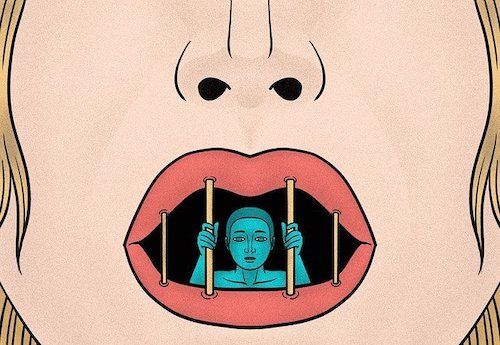
Unspoken Dialogue is very similar to a cliffhanger. While a cliffhanger refuses to resolve plot, this Unspoken Dialogue technique refuses to resolve the dialogue.
There’s tension when a character wants to say something, but doesn’t.
If you’re trying to learn how to write good dialogue, it’s always important to remember that characters don’t often say exactly what they’re thinking, or even what they want to say.
Why does this work to conclude a story? Well, it highlights the weakness of the character, how they are not doing what they want to be doing. They are holding back, and perhaps they will regret it later.
Examples:
“I wanted to say she’d lied to us all, she’d faked it about the dog, as if it mattered whether the animal spoke, as if love were about the truth, as if he would love her less — and not more — for pretending to talk to a dog.”
— Francine Prose, “Talking Dog”
“Tell more, more, I want to say to Eduardo but do not say because he seems ready to leave. Tell me about Garcilaso and about how things went well for him.”
— Joseph O’Neill, “The Sinking of the Houston”
“They are always very interested to hear that you don’t read music. Once, you almost said— to a sneaky fellow from the Daily News, who was inquiring— you almost turned to him and said Motherfucker I AM music. But a lady does not speak like that, however, and so you did not.”
— Zadie Smith, “Crazy They Call Me”
“She begins to scream, her face turning even redder, you cannot hear or understand what she is saying but you know she hates your father, hates you, hates many, many people. You want to help your father, the man who has only recently come back into your life, clean-shaven and speaking of God, you want to run toward him and defend him and protect him, but now he is holding out his hand to the man again, he has taken off his hat and is holding it out toward the man. The woman is now silent. The man takes the hat, a brand-new fedora with a feather, and puts it on his head. And looks at you, as if for the first time.”
— Justin Bigos, “Fingerprints”
Asking Questions

A question is one of the most popular ways to end a story (look at all the examples below!). I could even add more quite easily, like the question to conclude Margaret Atwood’s book, “Handmaid’s Tale”: “Are there any questions?”
But if you use this technique, I would recommend following these three guidelines:
- Must not have an easy answer
- Must resonate with the main themes of your book
- Must strike an emotional chord (look at the Russel Banks example).
Examples:
“But why are you invested in other people’s stories? You too must be unable to fill in the gaps. Can’t you be satisfied with your own dreams?”
— Antonio Tabucchi, “A Riddle”
“And who would she tell her stories to while he was gone? Who would listen?”
— Russel Banks, “My Mother’s Memoirs, My Father’s Lie, and Other True Stories”
“Then in the space of a wet blink, the gap between the trees would close and the mown grass disappear, a violent indigo cloud would cover the sun and history, gross history, daily history, would forget. Is this how it would be?”
— Julian Barnes, “Evermore”
“I imagined John-Jin’s girder underneath me. I wondered, in my rage, if you took that one piece away, would everything fall?”
— Rose Tremain, “John-Jin”
If a blind man could play basketball, surely we…If he had known Doc’s story would it have saved them? He hears himself saying the words. The ball arches from Doc’s fingertips, the miracle of it sinking. Would she have believed any of it?”
— John Edgar Wideman, “Doc’s Story”
“Safer and better to have no freedom, maybe, but no, you wouldn’t say that. The humming stopped when he flicked the light switch by the door. No you wouldn’t say that, would you? In the dark of the hall he could not see his way; he went toward the vague light of the front window with one hand on the wall. No you wouldn’t but what would you say?”
— Madison Smartt Bell, “Witness”
“Who was it that thought up that idea, the idea that had made today better than yesterday? Who loved him enough to think that up? Who loved him more than anyone else in the world loved him?
Her.
She did.”
— George Saunders, “Puppy”
“Where was she now, this Clara? What had become of her, this ardent, hopeful girl in her white dress, surrounded by her family, godparents, friends, that her Bible should end up in a Goodwill bin? Even if she no longer read it, or believed it, she wouldn’t have thrown it away, would she? Had something happened? Ah, girl, where were you?”
— Tobias Wolff, “Bible”
“He reached for the telephone and dialed his home number. ‘Rhona,’ he said in the quaking receiver. ‘Would you like to see the juvenile tuataras? The babies?’”
— Barbara Anderson, “Tuataras”
“But for the other man, who would be watching the night fall around the orange halo of the street lamps with neither longing nor dread, what did the future offer but the comfort of knowing that he would, when it was time for his daughter to carry out her plan of revenge, cooperate with a gentle willingness?”
— Yiyun Li, “A Man Like Him”
Emotions
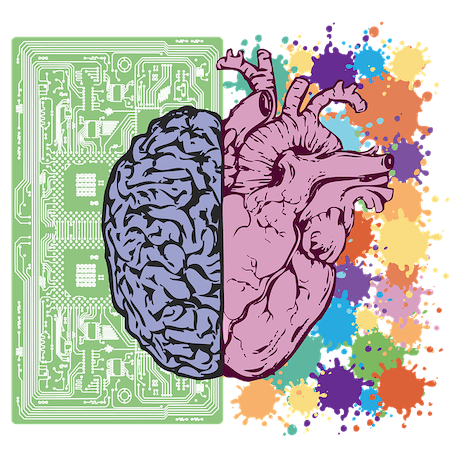
You can’t write good fiction without making your characters feel things (and your reader feel things). So here, we see authors ending stories by showing the final arc of their character’s emotions.
Some of these characters have emotional epiphanies, feeling something for the first time. Others have felt it all along but perhaps only now have been able to admit it to themselves.
But if character arc and character change are essential for stories, it makes sense that their emotional journey would conclude the narrative.
Examples:
“Even so, I sat there gazing up at the granite outcrops of Spruce Clove streaked in evening gold, I had an almost overpowering sense of being looked at myself, stared at in uncomprehending astonishment by some wild creature standing in the doorway.”
— James Lasdun, “Oh Death”
“I stand here shameless in ways he has never seen me. I am free, afloat, watching somebody else.”
— Bharati Mukherjee, “A Wife’s Story”
“She has done an outrageous thing, but she doesn’t feel guilty. She feels light and peaceful and filled with charity and temporarily without a name.”
— Margaret Atwood, “Hairball”
Contrast

Paul Harding, who won the Pulitzer Prize for “Tinkers,” said that contrast is the essential technique of music, painting, and storytelling.
Below, we see contrasts between:
- chill cats and stressed-out humans
- the busyness of day with the solitude of night
- the flowers of love with the chants for the dead.
When you contrast something, you throw it into higher relief. A happy person doesn’t seem exceptionally happy until you see her side by side with a depressed person.
Contrast offers that extra emphasis — much like repetition — to make the reader feel satisfied that this ending resolves the story.
Examples:
“She hears a distant siren, the wind in the trees, the bass beat from a passing car. Please, she thinks. Please. She is about to go inside for a flashlight when she hears the familiar bell and then sees the cat slinking up from the dark woods, her manner cool and unaffected.”
— Jill McCorkle, “Magic Words”
“Susanne sat on the couch, surrounded by her family while out in the night, partner to the extraordinary, Roy held a shovel made for digging deeper in the dirt.”
— Samantha Hunt, “The Yellow”
“By day she entertained a constant stream of visitors. At night her father kept vigil beside her bed.”
— Jennifer Haigh, “Paramour”
“Violins and lit candles revolved in the sky. Leo ran forward with flowers outthrust. Around the corner, Salzman, leaning against a wall, chanted prayers for the dead.”
— Bernard Malamud, “The Magic Barrel”
Memory

Marcel Proust’s memories brought back by the taste of a madeleine are probably the most famous memories in literature, but stories have always used memory to make readers nostalgic, evoke the senses, and make us feel the bite of time.
When you end a story with memory, it ties the whole story together — past is united with the present.
In some ways, ending a story with a memory is the opposite of a cliffhanger — memory looks at the past, while a cliffhanger anticipates the future.
Memory allows the writer to skip around in time to find the perfect character moment to end the story — which could be much, much earlier in their life, or only a few years back, or only last week.
Perhaps in the character’s current life, there’s no event that perfectly captures the emotion you’re going for, so mine the past for it.
Examples:
“I no longer remembered the day we married. Only the day I knew we would, those moments with my heart warm and rapt, the silent promise of the frozen world, the elm chafing in its coat of ice.”
— Karen Brown, “Galatea”
“…She will be secretly glad, relieved that time is passing, that Paris is again becoming nothing more than a word she might see on the cover of a glossy magazine or on a cable travel channel, certainly not a place where she once spent a few breaths of her life, and she will hardly remember the way the Seine sliced the city in half, a radiant curving knife, merciless and perfect.”
— Victoria Lancelotta, “The Anniversary Trip”
“He remembers waking up the morning after they bought the car, seeing it, there in the drive, in the sun, gleaming.”
— Raymond Carver, “Are These Actual Miles”
“Who will remember?”
— Alex Rose, “Ostracon”
“She will see the garden that day and the tears shining in her sister’s large blue eyes and remember her unanswered cry for help.”
— Sheila Kohler, “Magic Man”
“And as for the scar, I’m glad it is not on Nyamekye. Any time I see it I only recall one afternoon when I sat with my chin in my breast before a Mallam came, and after a Mallam went out.”
— Ama Ata Aidoo, “A Gift from Somewhere”
The Epiphany

The epiphany ending is the classic story ending. After everything the character has gone through, what have they learned?
This is the chance to show that the journey has not been in vain, that your characters have changed and learned and grown because of this journey.
Epiphanies are particularly useful for short stories, rather than novels, because short stories have less runway for plot. So you can’t have a huge murder or birth or world catastrophe solved at the end of a short story (the way most novels do), but you can show the character realizing something about themselves, others, or the world.
Examples:
“He closed the door carefully, not slamming it. Clea and I waited an appropriate interval, then turned and clung to each other in a kind of rapture. Understanding, abruptly and at last, just what it takes to be a King. How much, in the end it actually costs.”
— Jonathan Lethem, “The King of Sentences”
“He was shot five or six times, but being such a big man and such a strong man, he lived long enough to recognize the crack of the guns and know that he was dead.”
— Nathan Englander, “The Twenty-Seventh Man”
“Years later, as an adult, I realized that what my little sister had confided to me in a quiet voice in the wind cave was indeed true. Alice really does exist in the world. The March hare, the Mad Hatter, the Cheshire Cat— they all really exist.”
— Haruki Murakami, “The Wind Cave”
“— How d’you like my lion? Isn’t he beautiful? He’s made by a Zimbabwean artist, I think the name’s Dube.
— But the foolish interruption becomes revelation. Dumile, in his gaze — distant, lingering, speechless this time — reveals what has overwhelmed them. In this room. The space, the expensive antique chandelier, the consciously simple choice of reed blinds, the carved lion: all are on the same level of impact phenomena undifferentiated, undecipherable. Only the food that fed their hunger was real.”
— Nadine Gordimer, “Comrades”
“Sarah looked at him with an intent, halted expression, as though she were listening to a dialogue no one present was engaged in. Finally she said, “There are robbers. Everything has changed.”
— Joy Williams, “The Farm”
“And that was it. Somehow it didn’t really matter, finding out. Two years earlier, it would have changed my life. But on that day, I suppose the only thing I felt was some small measure of contentment for her: that he had, indeed, come back for her, just like she always said he would. They were different after all, destined to be together. I thanked Allen for bringing her things, watched him ride away on his motorcycle, and went inside to have dinner with my father.”
— Jess Walter, “Mr. Voice”
“And then, as if he had forgotten that she had already moved on to other things, as if we were still sitting across from each other, deep in one of our conversations without beginning, middle, or end, Room wrote that the last thing that had surprised her was that when Ershadi is lying in the grave he’s dug and his eyes finally drift closed and the screen goes black, it isn’t really black at all. If you look closely, you can see the rain falling.”
— Nicole Krauss, “Seeing Ershadi”
“‘No problem,’ the waitress sang, ‘no problem at all,’ replacing the girl’s fork, bending to snatch the soiled one off the floor. Smiling hard but not making eye contact with anyone. When she retreated leaving Richard alone with his son and the crying girl, it occurred to him, with the delayed logic of a dream, that the waitress must have thought he was the bad guy in all this.”
– Emma Cline, “Northeast Regional”
“But I remember you. I remember when we were so close that people couldn’t tell us apart. I remember your parents’ phone number, your neatly folded cutoffs and your constant fear of not being special. I remember when you started claiming that fictive characters are way better than friends, since they are less annoying, more interesting and never die. You stopped returning my calls. When I needed you the most you were nowhere to be found and when I died you started seeing me everywhere. On sidewalks, in shop windows, on balconies. So you decided to write my story. You dress me in cutoffs. You force extreme amounts of apple juice into me. You retell the most painful week of my life as it were a never-ending bachelor party. And it is not until the end. About. Here. That you realize what you’ve done. I’m not bitter, Miro. I’m just dead.”
— Jonas Hassen Khemiri, “As You Would Have Told It to Me (Sort Of) If We Had Known Each other Before You Died”
“It took some time for me to understand that Elida’s body had not been satiated on mine, that she wasn’t purring because she swallowed my heart.”
— Louise Erdrich, “The Big Cat”
“I used to think that all my emotions belonged in the past, to history, but I know that I yearn for the future just like everyone else. Even as life draws to close, I realize that I have never understood myself completely.
…If only…
But now it certainly is too late to do more, to be more, in this lifetime.”
— Zhang Jie, “An Unfinished Record”
I am born at noon the next day. My mother tells me this is the first thing she did: she checked the clock. I am still attached to her when she looks. We are not yet two when she begins to keep track of me, the seconds I have been alive and then, after she cuts through the cord herself, cleaving my body from hers with a kitchen knife, the seconds I have been on my own.
This is what women do, she says.
By which she means she understands that one day I will leave her too. Lift off the ground, think myself beyond gravity.
Let go.
—Aria Beth Sloss, “North”
The Unhappy Ending

The ending is one of your last chances to make the reader feel something. And while the happy ending is always a classic crowd-pleasing, I find that it’s often easier to make the reader feel sorrow.
Happiness is a tough sell, particularly when writing short stories. I think if you were going to survey 1000 short stories, a lot more would end sad than would end happy. Novels are probably the opposite — many more end happy than sad.
It’s mainly because of the length. When you’re writing short, you don’t have the time to acheive happiness without it feeling cheesy. While in the space of a novel, the happy ending feels earned.
Examples:
“Now they were both dead, and the city was dirty and crumbling, and the man I was traveling with was sero-positive, and so was I. Mexico’s hopes seemed as dashed as mine, and all the goofy innocence of that first thrilling trip abroad had died, my boyhood hopes for love and romance faded, just as the blue in Kay’s lapis had lost its intensity year after year until it ended up as white and small as a blind eye.”
— Edmund White, “Cinnamon Skin”
“Things are as they have always been. Whoever seeks a fixed point in the current of time and the seasons would do well to listen to the sounds of the night that never change. They come to us from out there.
— Amos Oz, “Where the Jackals Howl”
“She would be invisible, of course. No one would hear her. And nothing has happened, really that hasn’t happened before.”
— Margaret Atwood, “Wilderness Tips”
“There were women around Jesus when He died, the two Marys. They couldn’t do anything for Him. But neither could the men, who had all run away.”
— Robert Olen Butler, “Mr. Green”
“I think of the chimp, the one with the talking hands.
In the course of the experiment, that chimp had a baby. Imagine how her trainers must have thrilled when the mother, without prompting, began to sign to her newborn.
Baby, drink milk.
Baby, play ball.
And when the baby died, the mother stood over the body, her wrinkled hands moving with animal grace, forming again and again the words: Baby, come hug, Baby, come hug, fluent now in the language of grief.”
— Amy Hempel, In the Cemetery Where Al Jolson is Buried
“It was not a happy life, but it was all that was left to them, and they took it up without complaint, for they knew they were powerless against some Will infinitely stronger than their own.”
— Paul Laurence Dunbar, The Sport of the Gods
“What would burst forth? A monkey’s paw? A lady? A tiger?
But there was nothing at all.”
— Lorrie Monroe, “Referential”
The Waiting Ending
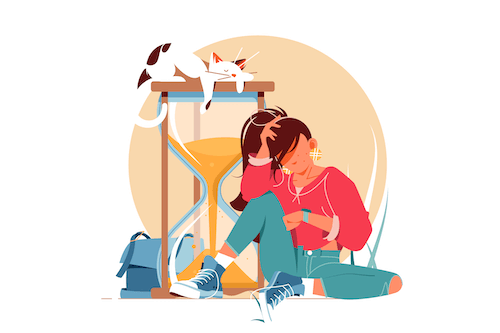
What does it mean when you have a character waiting at the end of a story? Well, they are expecting the future. But the reader can’t go to the future with them.
It signals a small break in the storyline: this current story has ended, but the future one has not begun. It’s like the character is about to step into narrative limbo.
A “waiting” ending is definitely a quiet ending. It takes advantage in a lull in the storyline to bow out and conclude.
If you write a waiting ending, pay careful attention to subtext:
- Perhaps this character will be waiting a long time.
- Perhaps they are the waiting type of character — a passive character.
- Perhaps waiting signals a sad ending — what they wanted most didn’t arrive by the end
Examples:
“I measured the passing of time by the progress of the fires in the distant north. My old man gave me daily updates, and I pretended to listen. Five hundred, a thousand, two thousand fires. After a month they had burned out, and I was still waiting.”
— Daniel Alarcón, “The Idiot President”
“He looked toward the eastern sky. It seemed he’d been running a week’s worth of nights, but he saw the stars hadn’t begun to pale. The first pink smudges on the far Ridgeline were a while away, perhaps hours. The night would linger long enough for what would come or not come. He waited.”
— Ron Rash, “Into the Gorge”
“The ice plant was watery-looking and fat, and at the edge of my vision I could see the tips of my father’s shoes. I was sixteen years old and waiting for the next thing he would tell me.”
— Ethan Canin, “The Year of Getting to Know Us”
“Wait here, wait here!” he cried and jumped up and began to run for help toward a cluster of light she saw in the distance ahead of him. “Help! Help!” he shouted, but his voice was thin, scarcely a thread of sound. The lights drifted farther away the faster he ran and his feet moved numbly as if they carried him nowhere. The tide of darkness seemed to sweep him back to her, postponing from moment to moment his entry into the world of guilt and sorrow.”
— Flannery O’Connor, “Everything that Rises Must Converge”
“Walking to the end of the hallway by the kitchen, he seated himself against the wall. He sat there quietly, waiting for Case to emerge.”
— Bradford Tice, “Missionaries”
“Joshua wondered what they would do now. The need he felt was like when he stepped on the sliver of glass, and his mother pulled at the skin with her tweezers, and pushed them inside, until she found the glass. It was like when she told him to get ready, to squeeze his father’s hand. Clenching his teeth, closing his eyes, waiting.”
— Mike Meginnis, “Navigators”
Figurative Language & Poetic Devices

Aristotle said that comparison of two unlike things was the essence of genius. If so, the writers below are all geniuses.
Beauty has its own charm. The examples below use extended metaphors, multiple similes, and other examples of literary devices to cast a spell of beauty over the reader.
And these comparisons are often symbolic of the characters and the events of the story (for instance, the birds in the Ann Beattie story).
Examples:
“She pulled in her horizon like a great fish-net. Pulled it from around the waist of the world and draped it over her shoulder. So much of life in its meshes! She called in her soul to come and see.”
— Zora Neale Hurston, Their Eyes Were Watching God
“Nettie lay there beside him, her breath blowing on his shoulder as they studied the stars far above the field — little pinpoint holes punched through the night sky like the needle holes around the tiny stitches in the quilting. Nettie. Nettie Slade. Her dress had self-covered buttons, hard like seed corn.”
— Bobbie Ann Mason, “Wish”
“Angela was remembering all this, and feeling such a strong surge of sorrowful loss, and at the same time she was studying with interest the miraculous rescue of St. Placidus from drowning, painted on the wall in the sacristy in San Miniato. St. Placidus was rolling fatalistically amid the blue waves of his pond while one of his comrades, endowed with special powers by St. Benedict, came walking across the water to save him. In the picture it looked like such a harmless little point, carved into the earth as neatly as a circle of stamped-out pastry, or a hole cut into the ice for fishing.”
— Tessa Hadley, “Cecilia Awakened”
“He looked at his wife, whom he loved, whom he looked forward to convincing, and felt as though he were diving headfirst into happiness. It was a circus act, a perilous one. Happiness was a narrow take. You had to make sure you cleared the lip.”
— Elizabeth McCracken, “Thunderstruck”
“In the flood of flame-colored light their flesh turned coral.”
— Helen Simpson, “Heavy Weather”
“Louisa sat, prayerfully numbering her days, like an uncloistered nun.”
— Mary E. Wilkins Freeman, “A New England Nun”
“When she turned back into the empty room she looked as though youth had touched her on the lips.”
— Edith Wharton, “The Angel at the Grave”
“In time, his breathing changed, and hers did. Calm sleep was now a missed breath — a small sound. They might have been two of the birds she so often thought of, flying separately between cliffs— birds whose movement, which might seem erratic, was always private, and so took them where they wanted to go.”
— Ann Beattie, “In Amalfi”
The Secret
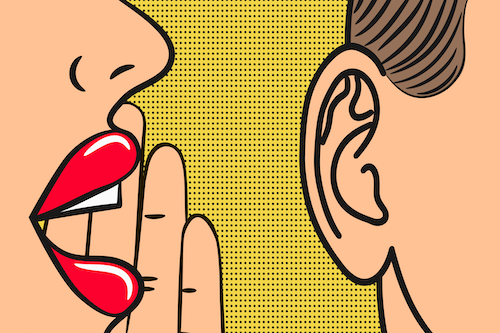
Brene Brown’s TED talk about vulnerability is one of the most watched TED talks of all time. Her thesis is simple: people respond to vulnerability.
It holds true in real life just as it does in fiction.
When a character keeps a secret, reveals a secret, or makes a confession, the reader feels closer to them. Even if we disagree with them, we feel like we know them.
Examples:
“The secret died with him, for Pavageau’s lips were ever sealed.”
— Alice Dunbar-Nelson, “The Stones of the Village”
“Very often I sold my blood to buy wine. Because I’d shared dirty needles with low companions, my blood was diseased. I can’t estimate how many people must have died from it. When I die myself, B.D. And Dundun, the angels of God I sneered at, will come to tally up my victims and tell me how many people I killed with my blood.”
— Denis Johnson, “Strangler Bob”
Powerful Dialogue

Here’s some advice on how to write a good dialogue ending:
- Pay attention to subtext. If any place in your story needs dialogue with a double meaning, it’s the ending. It should have a plain interpretation, but also resonate with some deeper issues of plot.
- Make sure it’s the protagonist who gets the final word. In almost all cases, it’s the protagonist or one of the main characters who speak last. A minor character wouldn’t make sense.
Examples:
“Please come back inside mom! Please get out of the street!”
— Antonya Nelson, “Chapter Two”
“Darling, the angels have themselves a lifetime to come to us.”
— Edwidge Danticat, “Night Women”
“Nemecia held a wineglass up to the window and turned it. “See how clear?” Shards of light moved across her face.”
— Kirstin Valdez Quade, “Nemecia”
“But I had my eyes closed. I thought I’d keep them that way for a little longer. I thought it was something I ought to do.
‘Well?’ He said, ‘Are you looking?’
My eyes are still closed. I was in my house. I knew that. But I didn’t feel like I was inside anything.
‘It’s really something,’ I said.”
— Raymond Carver, “Cathedral”
“My dear,” replied Valentine, “has not the Count just told us that all human wisdom is contained in the words ‘Wait and hope!”
— Alexandre Dumas, The Count of Monte Cristo
“There were lots of old people going around then with ideas in their heads that didn’t add up — though I suppose Old Annie had more than most. I recall her telling me another time that girl in the Home had a baby out of a big boil that burst on her stomach, and it was the size of a rat and had no life in it, but they put it in the oven and it puffed up the right size and baked to a good color and started to kick its legs (Ask an old woman to reminisce and you get the whole ragbag, is what you might be thinking by now.)
I told her that wasn’t possible, it must have been a dream.
‘Maybe so’ she said, agreeing with me for once. ‘I did used to have the terriblest dreams.’”
— Alice Munro, “A Wilderness Station”
A Character in Denial

The reader gets a sick sense of delight when final lines reveal something a character refuses to acknowledge.
Examples:
“Maybe it wasn’t such a terrible idea. Maybe it could make them happy. He found a mark on Miriam’s shimmering pale dress and followed it through the trees.”
— Sarah Kokernot, “M & L”
“His gut told him that his mother-in-law knew what had happened that day in the car. Come to think of it, she had never once mentioned the day of the accident to him. She had never even asked about it. His mother-in-law turned her cold gaze back to the plant. To put his crazy thoughts to rest, Oghi told himself that he just really liked plants. He could not think why that might be.”
— Hye-young Pyun, “Caring for Plants”
The Unknown

These final lines endear readers as characters reveal what remains mysterious:
Examples:
“But as I write this it occurs to me that I don’t know where I ever got that idea. In fact, I have no memory of whether the desk arrived to me with the drawer locked. It’s possible that I unknowingly pushed in the cylindrical lock years ago, and that whatever is in there belongs to me.”
— Nicole Krauss, “From the Desk of Daniel Varsky”
“’Listen to me,’ he said, expelling all his breath with the words. Two ragged breaths later he tried again, but Jill moved her hand from his forehead to his mouth. ‘Help me,’ he said into her fingers. But the words were whispered, and she mistook them for a kiss and smiled.”
— Angela Pneuman, “Occupational Hazard”
“He knew he was at the beginning of something, though just then he couldn’t say exactly what.”
— Bret Anthony Johnston, “Encounters with Unexpected Animals”
“I do not know where this voyage I have begun will end. I do not know which direction I will take. I dropped the package on a park bench and started walking.”
— Bharati Mukherjee, “The Management of Grief”
Truth

If anywhere it’s time to tell the truth, it’s the ending.
Have your characters spill their guts and reveal everything at the end. Or have the narrator offer wisdom or the naked truth.
Examples:
“It’s the kind of impossible story that holds a family together. You tell it over and over again; and with the passage of time, the tale becomes more unbelievable and at the same time increasingly difficult to disprove, a myth about the life you carry.”
– Greg Hrbek, “Sagittarius”
“As the manual often states, it’s my future. And it’s the only one I get.”
— Diane Cook, “Moving On”
“I’ve begun to appreciate just how much work parents invest in their children, and wives in their husbands; it’s only fair for the investor to become the beneficiary.”
— Katie Chase, “Man and Wife”
“…I survive. It’s only one thing. But it’s also everything.
Pick yourself up.
Start over again.”
— Megan Miranda, All the Missing Girls
“She was knickerless. She was victorious. She was a truly modern female.”
— Nicola Barker, “G-string”
“I can stay. I can lie down. Let the snow fall on my face. Let its hands be tender.
Or I can walk, try to find my way in darkness.
I’m a grown woman, an orphan, I have these choices.”
— Melanie Rae Thon, “The Snow Thief”

2 comments
Excellent collection of endings, types… and quite clear and efficient comments. Thank you.
It must be the great knowledge of writing I ever learned at the age of almost 80.